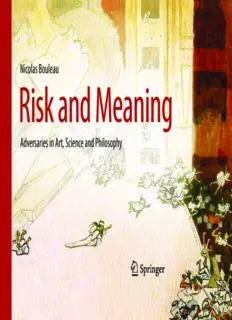
Risk and Meaning: Adversaries in Art, Science and Philosophy PDF
Preview Risk and Meaning: Adversaries in Art, Science and Philosophy
Risk and Meaning Nicolas Bouleau Risk and Meaning Adversaries in Art, Science and Philosophy Translated by Dené Oglesby and Martin Crossley Nicolas Bouleau Ecole des Ponts ParisTech Marne-la-Vallée, France [email protected] The publication of this book was helped by the contribution of the FONDATION DU RISQUE and the INSTITUT LOUIS BACHELIER ISBN 978-3-642-17646-3 e-ISBN 978-3-642-17647-0 DOI 10.1007/978-3-642-17647-0 Springer HeidelbergDordrecht LondonNewYork Library of Congress Control Number: 2011920822 © Springer-Verlag Berlin Heidelberg 2011 This work is subject to copyright. All rights are reserved, whether the whole or part of the material is concerned, specifically the rights of translation, reprinting, reuse of illustra- tions, recitation, broadcasting, reproduction on microfilm or in any other way, and storage in data banks. Duplication of this publication or parts thereof is permitted only under the provisions of the German Copyright Law of September 9, 1965, in its current version, and permission for use must always be obtained from Springer. Violations are liable to prosecution under the German Copyright Law. Although the best care has been devoted by the author to the research of all rights owners, he is well prepared to meet all copyright obligations pertainty about sources which could not be ascertained. Typesetting: ca mera-ready cop y prod uced by au thor using Q uarkX press. Cover design: eStudio Calamar S.L. Cover: «Le réveil de Samson ou la terreur des Philistins» watercolors by André Devambez (1867-1944), private collection, Paris. When the hair of Samson, cut by the lascivious Dalila, grew again, Samson recovered his strength and destroyed, as revenge, the temple of Gaza devoted to god Dagôn. He died under the debris together with the king of the Philistines and all the court. The story inspired Jean-Philippe Rameau who composed an opera on a libretto of Voltaire. Printed on acid-free paper Springer is part of Springer Science+Business Media (www.springer.com) In the first instance, risk seems no more than a part of an essential calculus [...] This is risk in a world where much remains as ‘given’, as fate, including external nature and those forms of social life coordinated by tradition. As nature becomes permeated by in- dustriatization and as tradition is dissolved, new type of incalculability emerge [...] ma- naging risks which nobody really knows has become one of our main preoccupations [...] Many believe that in the age of risk there can be only one authority left, and that is science. But this is not only a complete misunderstanding of science, it is also a complete misunderstanding of the notion of risk. Ulrich Beck, Politics of Risk Society, Polity Press 1998. Entrance : Interpretation and Paradigms, 1 I. Cicero and Divination, 13 II. Cournot’s “Philosophical Probabilities”, 29 III. Mathematical Probabilities, 47 IV. Democracy by Chance, 65 V. Gestalt, Structure, Pattern, 81 VI. The Third Dimension of Risk,109 VII. ‘Modern’ Architecture, 125 VIII. The Ideal City, 149 Risk and Meaning IX. Daring the Abstract in Art, 165 X. Saussure or the Dread of Mathematical Probabilities, 183 XI. Jacques Monod’s Roulette, 203 XII. From Fortuitism to Animism, 225 XIII. The Slip as Fortuity and Meaning, 243 XIV. Guessing Astronomy, 259 XV. The Legitimacy of Science and Love, 273 Hints and index, 293 Entrance : Interpretation and Paradigms
Description: